Former Port Adelaide officials deny Eddie McGuire’s claim surrounding contracts for prison-bar guernsey
Did Port Adelaide sign a contract when it entered the AFL stopping it from wearing its prison-bar guernsey? Eddie McGuire says yes. Now two ex-Port bosses tell their side of 1990s history.
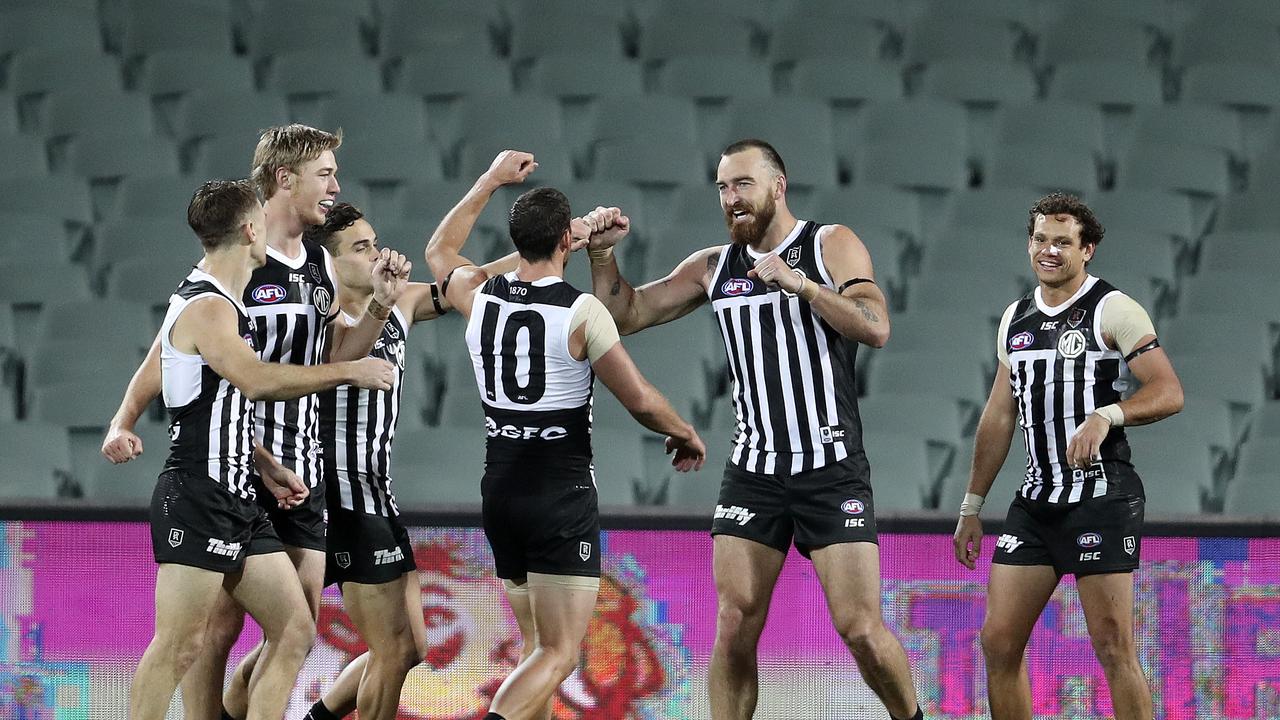
AFL
Don't miss out on the headlines from AFL. Followed categories will be added to My News.
It is the he-said-she-said that is anything but black and white.
Past and present Port Adelaide officials deny the club has ever signed contracts restricting when it can wear its prison-bar guernsey, as the Power prepares to submit a petition to don the black-and-white strip in home Showdowns.
Collingwood president Eddie McGuire is adamant use of the jumper – worn by Port in the SANFL, where it plays as the Magpies, since 1902 and five times in the national competition, including against Adelaide this year – is barred by AFL deals the Power have agreed to, and he has threatened legal action if the league endorses their bid to play in it more often.
Former Port president Greg Boulton and chief executive Brian Cunningham rejected McGuire’s claim, made on Footy Classified in June, that a contract was signed when the club entered the AFL that it would not use the design.
The Power wants to wear the prison-bar guernsey in all home matches against the Crows from next year and plan to make their case to the league at the end of the season, supported by a petition with more than 37,000 signatures.
Ahead of the Port-Collingwood clash at the Gabba on Monday, Boulton and Cunningham backed the Power’s jumper push and told News Corp that although the AFL said to the club it could not enter the competition wearing its traditional black-and-white strip or with Magpies as its nickname, they did not sign an agreement preventing the team from ever playing in it.
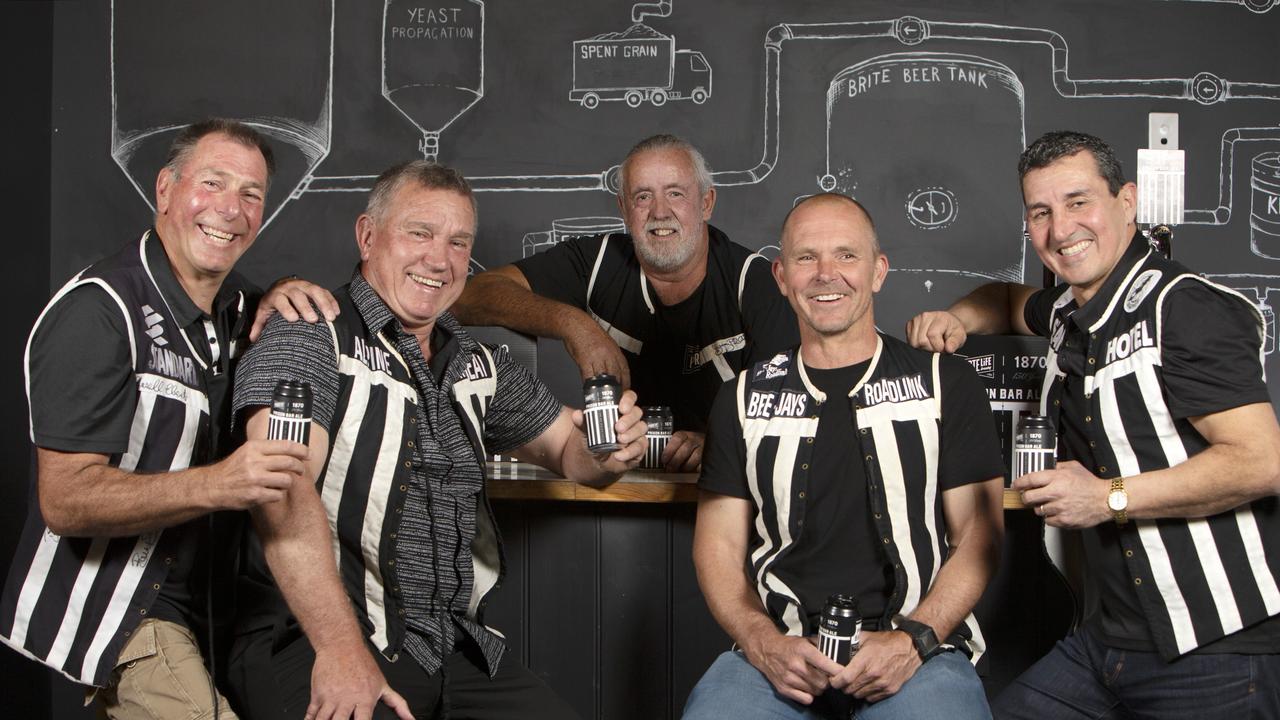
Not as part of Port’s failed 1990 bid, when the club won the second SA licence in 1994, joined the AFL in 1997 or any other time during Boulton’s presidency from 1992-2008.
“Our club was clearly told by the AFL that they already have a team in the competition that is black and white only, and we cannot use the Magpies logo,” Boulton said.
“We agreed that black and white was part of our history, but we’d add teal and silver.
“When we came into the competition there’s no way we signed or would’ve signed anything that says ‘we’ll never wear it’ – there’s no way that was done.
“There may have been Eddie saying things like ‘you can do it this time, don’t keep asking for it’.
“But to say there’s something legally enforceable, a contract, to stop us wearing the guernsey is not right.”
When asked about the existence of contracts with signatures of Port officials surrounding the use of the prison-bar guernsey, Cunningham said “never seen it, didn’t happen”.
“We were told early days by the AFL we couldn’t just have the black-and-white guernsey – the prison bars was out,” Cunningham said.
“We just wanted to get into the AFL and make everyone happy, Collingwood happy, so we didn’t press that point.
“It’s illogical – why would we sign something when it was never an issue for us?”
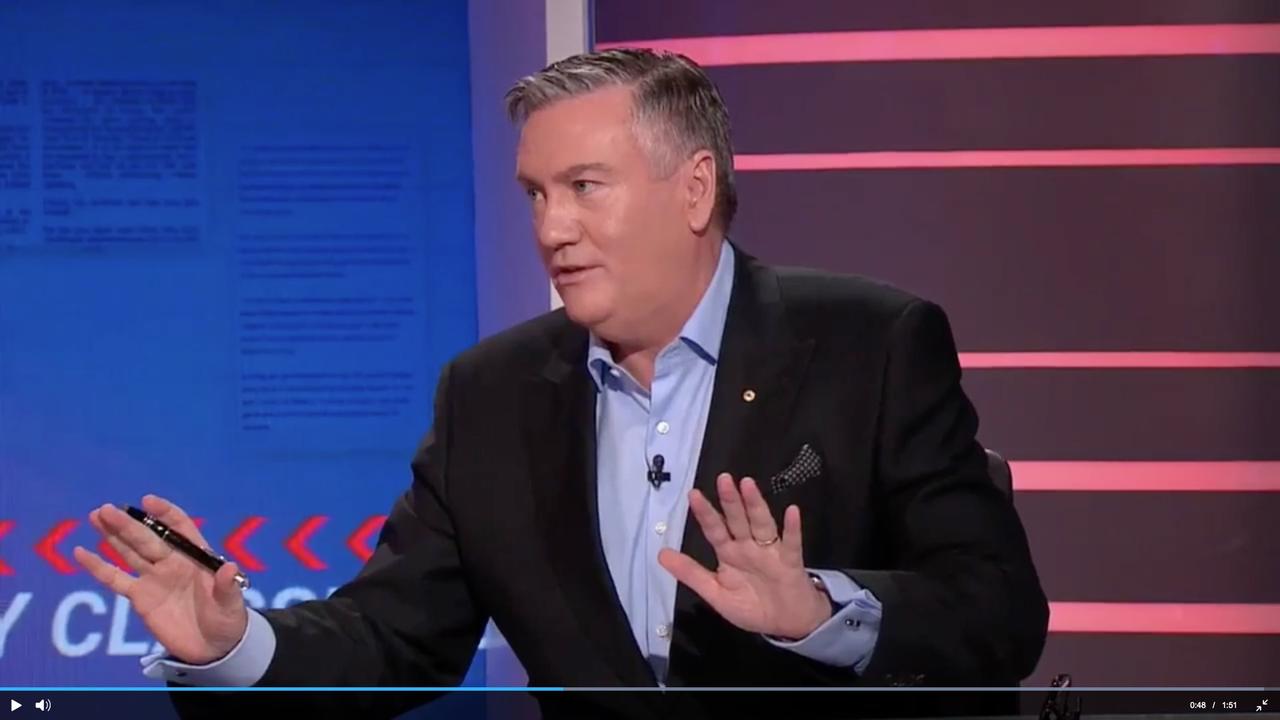
Port secured its AFL licence in 1994 then revealed its national-league colours, moniker and uniforms at Adelaide Entertainment Centre the following year.
Boulton said the club’s board and members were emotionally attached to the prison-bar guernsey during its AFL push, but were pragmatic knowing a new design was needed to join the competition.
“They knew it was part of our history but they knew we had to do it a different way,” he said.
“We kept pushing that we are still Port Adelaide Football Club, no matter what happens.”
Boulton said when it joined the AFL the club felt it was important that its traditional jumper and Magpies name were preserved in the SANFL after 1997.
It had also been hopeful the prison bars would make special appearances at the elite level.
Port first wore them – a replica of the jumper of the club’s 1914 unbeaten side – in its seventh AFL season, in 2003, when the league introduced Heritage Round.
The Power also played in it in the 2007 Heritage Round, their last AFL game at Football Park in 2013, the elimination final versus Richmond in 2014 and against Adelaide in June.
McGuire said in June that Collingwood had approved every Port request to wear the strip for special occasions but the clubs agreed the Crows game would be its last time using it.
In response, Port chairman David Koch denied there had been a once-more-and-done deal.
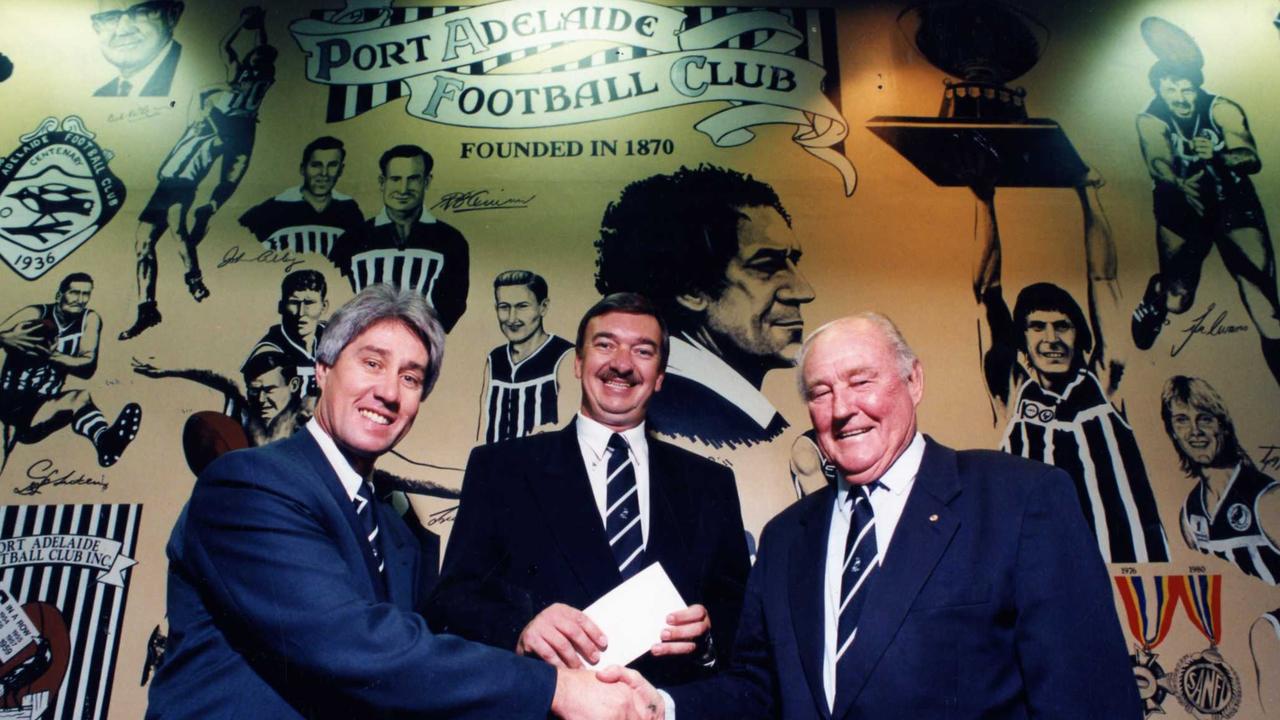
Boulton believed the Power playing in the guernsey in one game each year would be “good for South Australia, good for our club and good for anyone who likes reflecting on history”.
“Eddie’s a smart guy and he looks after his club and supporters, as I would and did,” he said.
“If someone came to me while I was president and said ‘we like your teal, black and silver … can we use it in the AFL?’ I’d say ‘go for a long walk’.”
Collingwood’s president at the time of Port’s AFL entry, the late Allan McAlister, was just as protective of his club’s colours and nickname.
He was a roadblock to Port’s AFL bid in 1990 because of the clubs’ clash in black-and-white jumpers and remained a vocal critic of the idea the SA side could wear its SANFL colours on the big stage, saying in 1994 “there is room for only one black-and-white team in the AFL and that is Collingwood”.
McAlister was content when the Power revealed their inaugural guernseys on August 31, 1995, calling them “satisfactory”.
“They had no hope of going in with black and white – they had no choice but to change,” said McAlister, who died last year.
When Port sought to add new colours to differentiate itself from Collingwood, an NBA franchise caught the eye.
“The Charlotte Hornets’ colour (teal) was the one that we liked best … and we liked that combination of black, white, teal and silver,” Cunningham said.
Cunningham noted the inaugural Power guernseys – designed by Ian Kidd – had a deliberate nod to the club’s past.
The back was similar to the prison-bar uniforms, except with teal above the white number panel, rather than black.
In recent seasons, the back of Port’s home AFL uniform has mirrored those on its SANFL strips since the 1950s.
“Those (original Power) guernseys served us very well and I’d like to see that (2004) grand final guernsey occasionally appear, it would be nice,” Cunningham said.
The day after Port revealed those uniforms and its nickname in 1995, a curious document with McAlister’s name on it arrived at Alberton.
Typed on a Collingwood letterhead, it said the Victorian powerhouse was grateful for the name and colour changes but it would remove its objections if Port ranked higher than it in three successive AFL seasons.
The Power did so in their first three campaigns but never chased it up, believing it was highly unlikely McAlister was behind the letter.
“Some people say it’s not true, it’s just a fake and someone drew it up, but we didn’t draw it up,” Cunningham said.
Boulton added: “We didn’t take a lot of credibility in the document.”
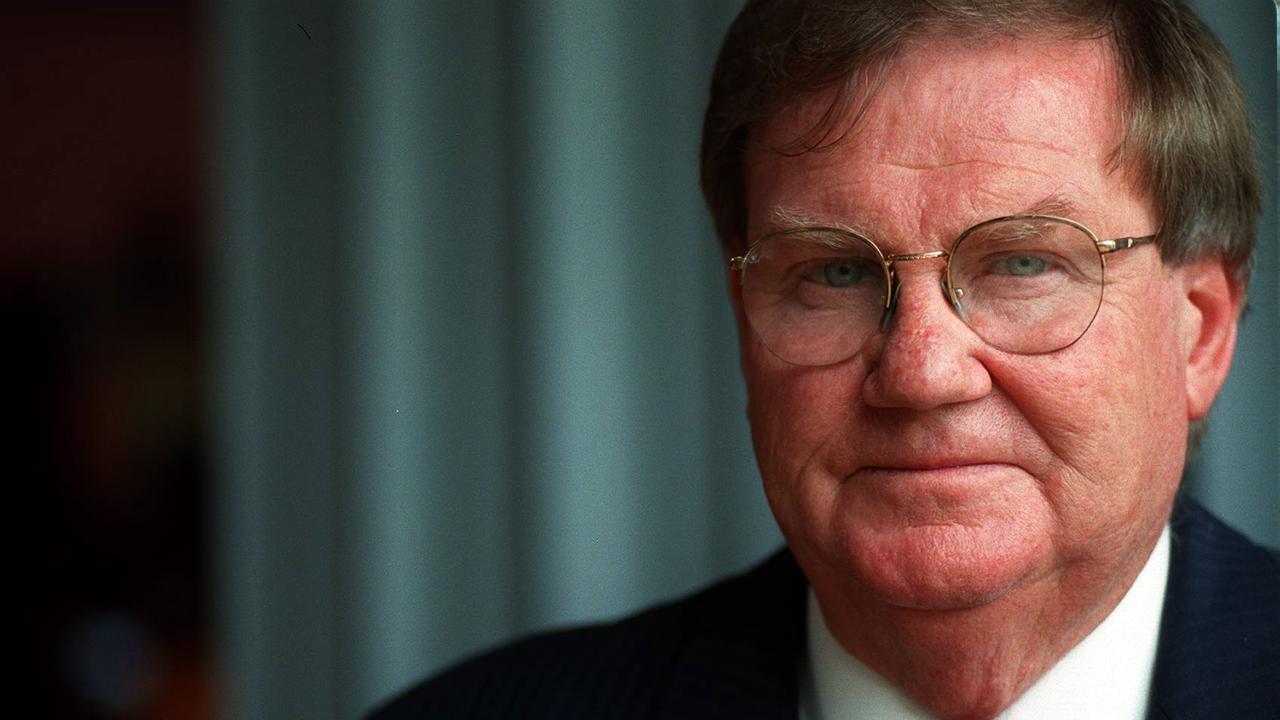
The AFL’s chief executive from 1986-96, Ross Oakley, told News Corp he could not recall any contracts from his time stopping Port from using the prison-bar guernsey, saying “there may well have been, but I don’t remember”.
Oakley said wearing a jumper that was not solely black-and-white and not being known as the Magpies were among Port’s conditions of entry into the national competition.
“Initially there was a bit of pushback but deep down you couldn’t have two teams in black and white jumpers, and the Magpies in the same competition, and they backed down fairly quickly on that,” Oakley said.
“It would have been a compromise too far to allow the prison bars at that point in time.”
Oakley said the prison-bar guernsey was one of Port’s “signature elements” and he did not see anything wrong with the club trying to wear it annually against the Crows.
But he was not surprised by Collingwood continuing to bristle over the Power’s push to use black-and-white stripes.
“If I was in Eddie’s position I would too,” he said.
A 2007 agreement between Port, Collingwood and the AFL could be central to the Power’s submission to wear the prison-bar guernsey in Showdowns.
The pact approved the use of the strip in home Heritage Rounds – but the commemorative fixtures ceased after that season.
Port argues Showdowns represent “the heritage of South Australian football” and if Collingwood has allowed the Power to wear the prison-bars in a round that no longer exists, games against the Crows are a fair substitute.
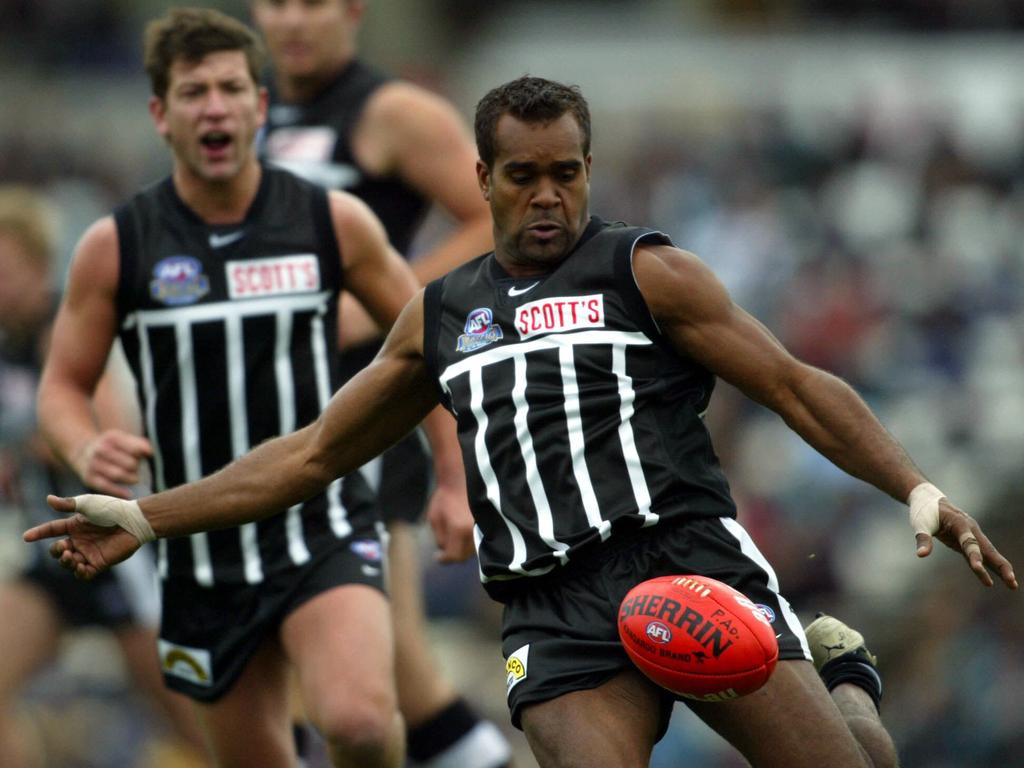
Power chief executive Keith Thomas said the club was committed to fighting to wear the prison-bar guernsey in home Showdowns but right now the 13-3 side was focused on its premiership tilt.
Last week Port sponsor Pirate Life Brewing played its part in building the club’s momentum, releasing a Prison Bar Ale featuring the black-and-white guernsey on cans.
“The prison-bar guernsey submission is very important to the club and our people,” Thomas said.
“We look forward to presenting to the AFL post-season.”
In June, McGuire said: “Port Adelaide signed a petition – it was called a contract. They signed it twice, coming into the competition and another one that’s got my signature and Gill McLachlan’s signature on it and the president of Port Adelaide”.
“They (AFL) must defend the copyright, because that is the central tenant of the commission when we put them in place, otherwise they will be in breach of their own copyright and the constitution of the AFL,” he said.
“It’s a simple solution – they (the AFL) say ‘no’ and we move forward.
“If they (Port) want to have a prison-bar jumper without black and white, knock themselves out.”
McGuire did not want to comment further last week, apart from reiterating “the contracts are signed and at the AFL”.
The AFL was unable to confirm or refute whether there were specific contracts preventing the prison-bar jumper’s use.
A league spokesman said the AFL was responsible for approving all club guernsey designs and determining what teams wore each match.
“Each year the clubs can put in special requests for additional commemorative or event based guernseys,” the spokesman said.
Originally published as Former Port Adelaide officials deny Eddie McGuire’s claim surrounding contracts for prison-bar guernsey







